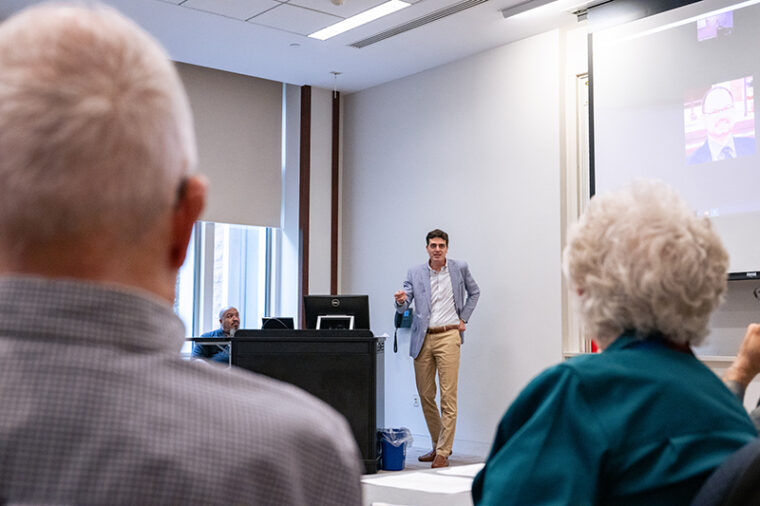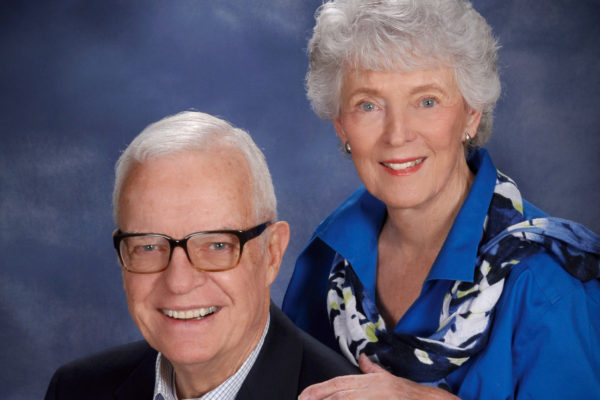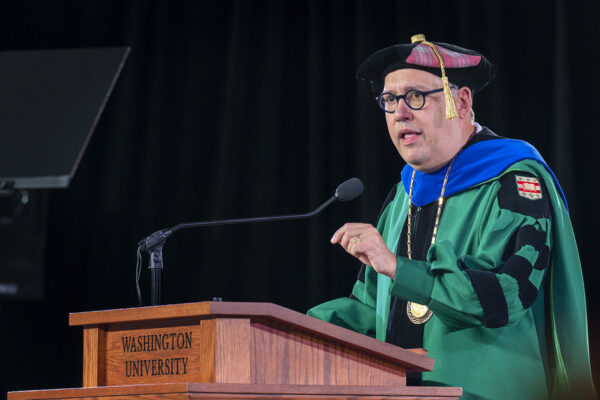An initiative launched earlier this year at Washington University in St. Louis to foster an understanding of civil discourse, free markets, free speech and personal responsibility already has provided funding to six faculty projects as well as one for a local school district, with more funding opportunities available.
Established through a gift from alumnus and Emeritus Trustee Robert “Bob” Frick and his wife, Barbara, the Frick Initiative aims to “show the value of civil discourse and free speech in our academic setting but, more generally, in a wide array of activities,” said Russell Osgood, dean of the School of Law and co-convener of the initiative’s steering committee.
Funds from the multidisciplinary Frick Initiative support a broad range of grants, opportunities and university events. Mahendra Gupta, the Geraldine J. and Robert L. Virgil Professor of Accounting and Management at Olin Business School, also serves as a committee co-convener.
A mini-conference on the Frick Initiative was held Sept. 11 on the Danforth Campus, during which funding recipients shared presentations and projected outcomes of their projects and visited with the Fricks.
Among the projects in the works are:
- Creating a “Civil Society Initiative,” which includes two new WashU courses on civil discourse and personal responsibility and on disagreement, extremism and polarization.
- Collecting political-origin stories to highlight commonalities among different political views and parties.
- Rewriting the Webster Groves High School government class offerings based on the core principles of civil discourse and free speech; personal responsibility of being an engaged citizen; and economics’ impact on decision-making and perspective.
- Establishing an Ethics Bowl, an academic competition focused on civil discourse and consensus building.
- Expanding student capacity in a current course that focuses on free speech on campuses.
“The initiative funds programs across a wide spectrum,” said third-year law school student Ryan McLaughlin, who helps coordinate the effort as a Frick Fellow and a member of the steering committee.
“It focuses on four guiding principles: free speech, civil discourse, free and open markets, and personal responsibility. Focusing on these principles leaves space for applicants to be creative with their projects, and we believe creative solutions are what we need.”
People nationwide express concerns about the lack of civility in our country and feel they cannot openly express their views, McLaughlin said, so this initiative aims to provide the tools and confidence to engage in civil discourse.
“We believe facing up to this problem is imperative and do not want to stymie any good ideas WashU folks — or anyone — might have,” McLaughlin said. “The Frick Initiative is interested in supporting people from all walks of life and disciplines to get a diverse set of projects and ideas.”
“The Frick Initiative is allowing us to break new ground in Arts & Sciences, both with our course offerings and our ability to engage the public in civil discourse concerning questions of great importance to a functioning democracy,” said Ron Mallon, chair and professor of philosophy and philosophy-neuroscience-psychology.
“We think there is vast interest in productive discussion on campus, and we have great hopes that this is the beginning of even bigger things to come,” said Mallon, whose Frick Initiative project “Civil Society Initiative” seeks to recruit a cohort of undergraduate students to research civil society and organize a series of public debates to promote civil discourse among WashU students.
The Frick Initiative conference was designed to allow recipients to interact and to increase collaboration on their projects.
“Many of the projects have overlap, and we want to encourage recipients to work together and use each other as resources,” McLaughlin said. “We want recipients to feel like they are part of a community, and this conference was a step toward making that happen.”
Recipients gave brief presentations outlining their projects and goals, he said, and also heard from Robert and Barbara Frick, who shared their background.
“We are impressed with the breadth of projects the committee selected and that all are focused on our initial goals,” Bob Frick said. “The selected projects should impact university and high school students as well as those serving in public office, business and other organizations while accomplishing our vision for this important initiative.
“We’re excited and encouraged that some projects are expected to expand and be scaled to partner with more school districts and universities,” Barbara Frick said. “The enthusiasm in the room and the exchange of ideas between the project recipients were gratifying.”
The couple, who live in the San Francisco Bay area, are longtime supporters of WashU. The popular multilevel forum and adjoining commons area in Knight Hall are named in their honor in recognition of their generous gifts and commitments to Olin Business School. They also established an endowed professorship in business and have made ongoing contributions for scholarships at Olin.
Bob Frick, a former vice chairman of the board of Bank of America, graduated from Washington University in 1960 with a bachelor’s degree in civil engineering and a master’s degree in business administration from the Olin Business School in 1962. Over the years, he has served WashU in numerous leadership capacities, including as a member of the Board of Trustees, Olin’s National Council and the San Francisco Regional Cabinet.
Like Bob, Barbara is a St. Louis area native. She has a bachelor’s degree from the University of Kansas and a master’s degree from San Jose State University. With Bob, she formed K.E.S. Management Company, which provides quality housing for low- and moderate-income families in ethnically diverse neighborhoods. She is president of the firm and widely recognized for her community service.
For more information and to apply for funding, which is open to all, visit the Frick Initiative page on the School of Law website. Applications are considered, and funding decisions made, on an ongoing basis.


